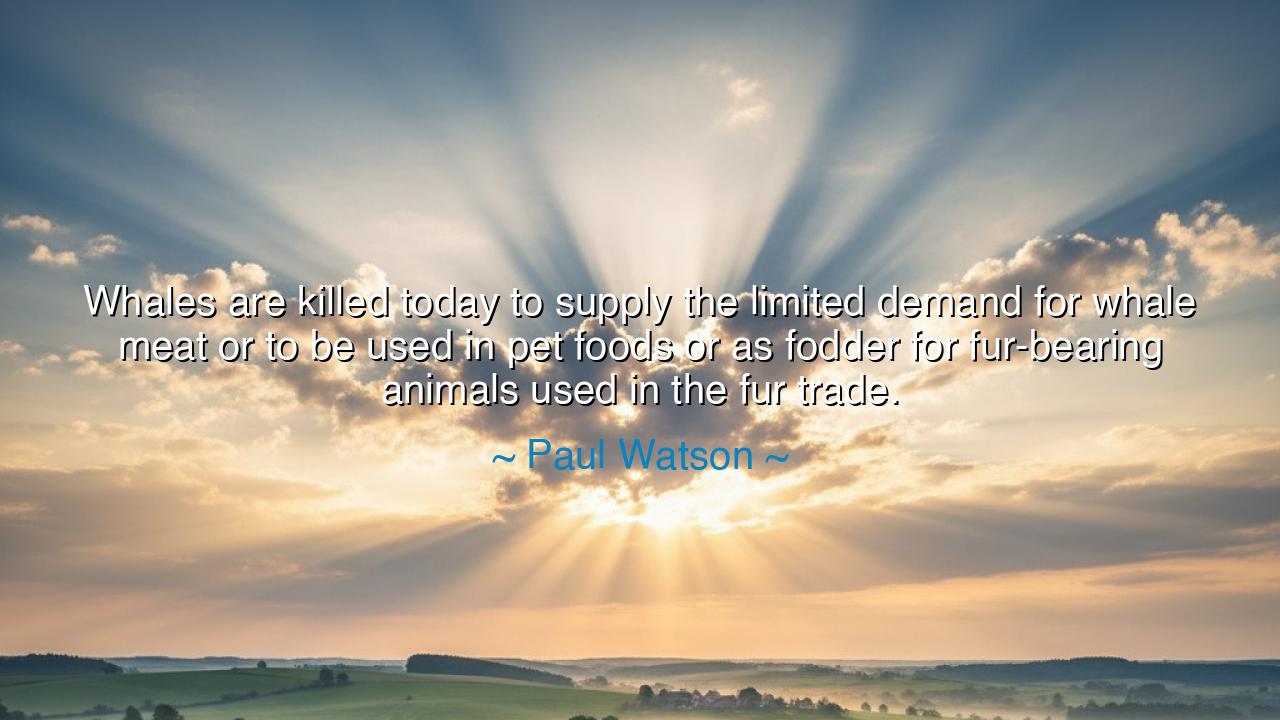
Whales are killed today to supply the limited demand for whale
Whales are killed today to supply the limited demand for whale meat or to be used in pet foods or as fodder for fur-bearing animals used in the fur trade.






Hear, O children of the earth, the solemn words of Paul Watson, defender of the seas: “Whales are killed today to supply the limited demand for whale meat or to be used in pet foods or as fodder for fur-bearing animals used in the fur trade.” At first, this statement reads as a stark fact, a record of commerce. Yet beneath it lies a cry as old as creation itself: that man, blinded by greed, slays giants not out of necessity but for vanity, not for survival but for profit. It is a lamentation and a warning, reminding us that when we betray the great creatures of the deep, we betray the very balance of life.
The whale, mighty and ancient, has long been a symbol of awe. In the sacred songs of the ancients, it appears as Leviathan, the untamed force of the oceans. To the Polynesians, it was guardian and guide across the seas. To the Inuit, it was a gift of survival in icy lands. Yet in modern times, these creatures, who sing across oceans and live longer than men, are pursued and slaughtered not for sustenance of tribes or survival of nations, but to fill trivial markets—pet food and fur trade. Such is the tragedy that Watson unveils: that the noblest beings are laid low for the basest of desires.
History is filled with examples of this folly. In the 19th century, the great whaling fleets of America and Europe scoured the seas, hunting whales not for meat to feed the hungry, but for oil to light lamps and grease machinery. Towns such as New Bedford grew rich while the oceans grew silent. The whale, sovereign of the waters, was reduced to barrels of oil and corset stays. And yet, when petroleum was discovered, the industry collapsed—not because men grew wise, but because they found a cheaper substitute. The whales were left nearly extinct, their suffering a testament to human blindness.
Paul Watson, inheriting the legacy of those who refused such blindness, turned from words to action. He and his companions sailed the seas under the banner of Sea Shepherd, placing their ships between harpoons and whales, raising their voices against the slaughter. In his quote, he names the futility of modern whaling: there is no great need, no starving people, no noble cause. Only “limited demand,” only frivolous trade, only indulgence clothed as tradition. The waste is laid bare; the injustice, undeniable.
O listener, there is here a teaching not only about whales, but about the nature of exploitation. Whenever man values profit over life, he risks tearing apart the fabric of creation. The sea is not endless; the creatures are not unnumbered. To kill for survival is one thing, but to kill for vanity is another, and it carries with it the curse of imbalance. The ancients feared angering the gods of the sea; we, too, should fear what comes when ecosystems collapse, when silence falls where once the oceans sang.
The lesson, then, is this: cherish the great beings of earth and sea, and do not trade their lives for trifles. Resist the temptation to excuse cruelty as culture or necessity when it is neither. Let no whale be slain for fashion, no song silenced for profit. If you are a consumer, choose wisely; if you are a leader, defend fiercely; if you are a dreamer, speak boldly. For the survival of the whale is not only its own—it is the survival of the seas, and the seas are the breath of the world.
Thus I say: honor the words of Paul Watson. Let them pierce your heart as the harpoon pierces the flesh of the whale, and let your soul cry out against such waste. For the day we protect the mighty whale, not as meat or fodder, but as a living miracle, is the day we prove ourselves worthy stewards of the earth. Until then, may his words remind us that to destroy beauty for vanity is to hasten our own undoing.






AAdministratorAdministrator
Welcome, honored guests. Please leave a comment, we will respond soon